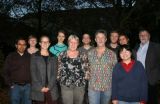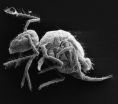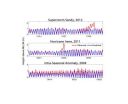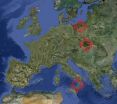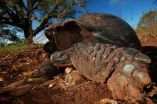(Press-News.org) In a new study published in the scientific journal Circulation, scientists at Karolinska Institutet and Karolinska University Hospital in Sweden show that an enzyme called arginase might have a key part to play in the development of cardiovascular disease in patients who already have type II diabetes. According to the team, arginase prevents the formation of protective nitrogen oxide in the blood vessels, and treatments that inhibit this enzyme reduce the risk of angina in diabetics.
"The fact that we could demonstrate the presence of arginase in several types of cell in the vessel wall gives us an entirely new explanatory model for the development of complications in these patients," says lead investigator Professor John Pernow.
Complications in diabetes patients result from constrictions of the blood vessels caused by plaque deposits on the vessel walls (atherosclerosis). The ensuing reduction in blood flow and oxygen supply can lead to angina, myocardial infarction or stroke, and possible amputation. Atherosclerosis is more common in people who smoke and who have high levels of blood lipids, although the risk is most pronounced in patients with diabetes. The reason for this correlation between diabetes and cardiovascular disease has largely eluded scientists and there is still no specific treatment for these complications.
In this present study, the researchers analysed the function of the arginase enzyme (or protein) in the blood vessels of patients with both type II diabetes and angina and found that it prevents the formation of protective molecule nitric oxide in the vessel wall. After introducing a substance already known to inhibit the enzyme, they observed a significant improvement in blood vessel function in these patients.
A comparative analysis showed that the arginase inhibitor did not have the same positive effect on patients with angina but without type II diabetes, and had no effect at all on healthy controls.
"Nitric oxide has a very important function to perform in the vessel walls," says Professor Pernow. "Apart from dilating them, it prevents the formation of plaque. For some reason, however, the mechanism is impaired in people with diabetes."
A total of 48 patients were included in the study and the team is now planning a larger follow-up study to confirm their results and develop treatments using arginase inhibitors. The study was financed by the Swedish Research Council, the Swedish Heart-Lung Foundation, the NovoNordisk Foundation, the European Foundation for the Study of Diabetes, and the Gustav V and Queen Victoria Foundation.
###
Publication: 'Arginase inhibition improves endothelial function in patients with coronary artery disease and type 2 diabetes', Alexey Shemyakin, Oskar Kövamees, Arnar Rafnsson, Felix Böhm, Peter Svenarud, Magnus Settergren, Christian Jung and John Pernow, Circulation, online 26 November 2012.
For further information, please contact:
John Pernow, Professor of cardiology
Department of Medicine, Solna – Karolinska Institutet
Tel: +46 (0)70-4848361
Email: john.pernow@ki.se
Contact the Press Office and download a photo: http://ki.se/pressroom
Karolinska Institutet is one of the world's leading medical universities. It accounts for over 40 per cent of the medical academic research conducted in Sweden and offers the country's broadest range of education in medicine and health sciences. Since 1901 the Nobel Assembly at Karolinska Institutet has selected the Nobel laureates in Physiology or Medicine.
Enzyme explains angina in diabetics
2012-11-27
ELSE PRESS RELEASES FROM THIS DATE:
New method for diagnosing malaria
2012-11-27
Malaria is a life-threatening disease that strikes more than 200 million people every year – mainly in Africa, Asia and Latin America. The disease is caused by the Plasmodium parasite, which is spread by infected mosquito bites. Today, malaria can be prevented and successfully treated, but more than half a million people nevertheless die every year from the disease.
Large-scale monitoring and treatment programmes during the past decade have reduced the distribution of the disease, and the frequency of actual epidemics has fallen. However, the number of malaria patients ...
A rather thin and long new snake crawls out of one of Earth's biodiversity hotspots
2012-11-27
Field and laboratory work by a group of zoologists led by Omar Torres-Carvajal from Museo de Zoología QCAZ, Pontificia Universidad Católica del Ecuador, has resulted in the discovery of a new species of blunt-headed vine snake from the Chocoan forests in northwestern Ecuador. This region is part of the 274,597 km2 Tumbes-Chocó-Magdalena hotspot that lies west of the Andes. The study was published in the open access journal ZooKeys.
Blunt-headed vine snakes live in an area comprising Mexico and Argentina, and are different from all other New World snakes in having a very ...
Three new arthropod species have been found in the Maestrazgo Caves in Teruel
2012-11-27
A team of scientists from the University of Navarra and the Catalan Association of Biospeleology have discovered three new collembolan species in the Maestrazgo caves in Teruel, Spain. Their description has been published in the Zootaxa journal. These minute animals belong to one of the most ancient animal species on the planet.
The Maestrazgo caves in Teruel are located in a region of the Iberian Range where fauna has not been the subject of much study. It is a very isolated region since its average altitude is between 1,550 m and 2,000 m asl and its climate can be described ...
New test to help heavy drinkers reduce alcohol intake
2012-11-27
Researchers at the University of Liverpool have developed a computer-based test that could help heavy drinkers reduce their alcohol consumption.
Regular heavy drinking can lead to serious health conditions such as liver and heart disease, costing the NHS millions of pounds every year. Research at Liverpool has shown that the habit of consuming alcohol can be interrupted when people practice methods of restraint whenever they see images of alcoholic drinks.
The team developed a computer test that required participants to press particular buttons when an image of alcohol ...
Paralysis by analysis should not delay decisions on climate change
2012-11-27
Uncertainty about how much the climate is changing is not a reason to delay preparing for the harmful impacts of climate change says Professor Jim Hall of the Environmental Change Institute at the University of Oxford and colleagues at the Tyndall Centre for Climate Change Research, writing today in Nature Climate Change.
The costs of adapting to climate change, sea-level and flooding include the upfront expenses of upgrading infrastructure, installing early-warning systems, and effective organisations, as well as the costs of reducing risk, such as not building on flood ...
Researcher studies 'middle ground' of sea-level change
2012-11-27
The effects of storm surge and sea-level rise have become topics of everyday conversation in the days and weeks following Hurricane Sandy's catastrophic landfall along the mid-Atlantic coast.
Ongoing research by professor John Brubaker of the Virginia Institute of Marine Science is throwing light on another, less-familiar component of sea-level variability—the "intra-seasonal" changes that occupy the middle ground between rapid, storm-related surges in sea level and the long-term increase in sea level due to global climate change.
"These are cases when the water is ...
From Mediterranean coasts to Tatra Mountains and beyond: Plant chromosome number variation
2012-11-27
Chromosome number is the most basic feature concerning the genome of a species, and it is known for about one third of higher plant species. In particular, for plants of Italy, Slovakia, and Poland, online chromosome number databases have been developed: 'Chrobase.it – Chromosome numbers for the Italian flora', 'Karyological database of ferns and flowering plants of Slovakia' and 'Chromosome number database – PLANTS', respectively. The three datasets account for about 35%, 60% and 40% of the whole floras, respectively.
"We used these datasets to compare chromosome number ...
Researchers explore social media as preventative method for infectious diseases
2012-11-27
MANHATTAN, Kan. -- When it comes to stopping illness, social media posts and tweets may be just what the doctor ordered.
A Kansas State University-led research team is looking at social media as a tool to reduce and prevent diseases from spreading. Researchers are studying whether a well-timed post from a public authority or trustworthy person could be as beneficial as flu shots, hand-washing or sneezing into an elbow.
"Infectious diseases are a serious problem and historically have been a major cause of death," said Faryad Sahneh, Kansas State University doctoral candidate ...
Man's best friend: Common canine virus may lead to new vaccines for deadly human diseases
2012-11-27
Athens, Ga. – Researchers at the University of Georgia have discovered that a virus commonly found in dogs may serve as the foundation for the next great breakthrough in human vaccine development.
Although harmless in humans, parainfluenza virus 5, or PIV5, is thought to contribute to upper respiratory infections in dogs, and it is a common target for canine vaccines designed to prevent kennel cough. In a paper published recently in PLOS ONE, researchers describe how this virus could be used in humans to protect against diseases that have eluded vaccine efforts for decades.
"We ...
Galapagos tortoises are a migrating species
2012-11-27
This press release is available in German.
The Galapagos giant tortoise, one of the most fascinating species of the Galapagos archipelago, treks slowly and untiringly across the volcanic slopes. Scientists of the Max Planck Institute for Ornithology in Radolfzell, together with the Charles Darwin Foundation, have used GPS technology and modern 3D acceleration measurements to find out that especially the dominant male tortoise wanders up to 10 kilometres into the highlands of the island. Only the fully grown animals migrate, the young tortoises stay year round in ...
